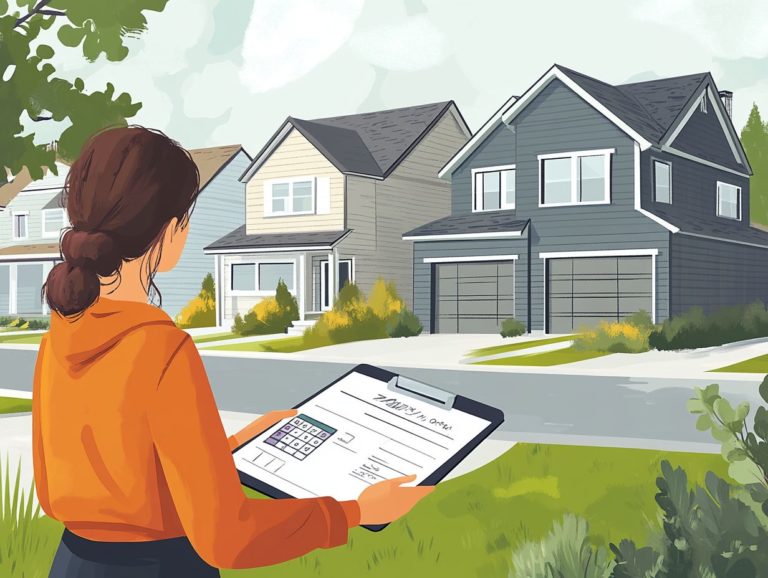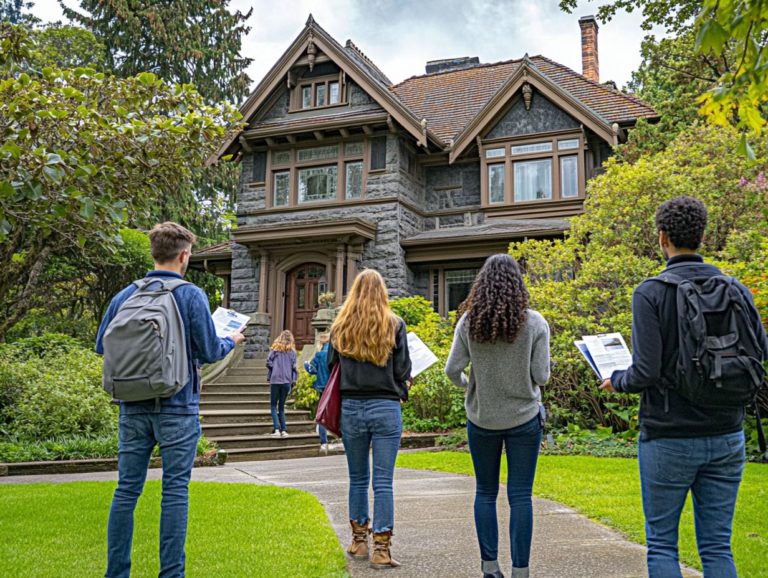How to Budget for Your First Home
Buying your first home is a thrilling milestone, but it can also feel like a whirlwind, especially when it comes to your finances. The sooner you start budgeting, the sooner you ll be on the path to owning your dream home!
Understanding how to budget effectively is essential for making informed decisions throughout the home-buying journey. This guide will empower you to assess your finances, calculate your income and expenses, and establish a realistic budget.
You ll discover strategies for finding affordable housing, saving for a down payment, managing your mortgage, and accounting for those extra expenses that often pop up.
With practical tips designed to keep you on track, you ll be well-equipped to navigate this significant investment with confidence.
Contents
- Key Takeaways:
- The Importance of Budgeting for Your First Home
- Assessing Your Finances
- Determining Your Budget
- Finding Affordable Housing Options
- Saving for a Down Payment
- Managing Your Mortgage
- Additional Expenses to Consider
- Sticking to Your Budget
- Frequently Asked Questions
- What are the first steps in budgeting for your first home?
- How do I determine my budget for my first home?
- What are some ways to save for a down payment on my first home?
- Is it important to get pre-approved for a mortgage before starting my home search?
- How can I make my budget more flexible for unexpected expenses when purchasing my first home?
- Are there any extra costs to consider when budgeting for my first home?
Key Takeaways:

Assess your finances by calculating your income and expenses before setting a budget for your first home. You can find helpful tips on how to stay within your housing budget as you navigate this important process.
Do your research and consider all factors when looking for affordable housing options.
Manage your mortgage and be prepared for additional expenses such as home maintenance, insurance, and taxes. Stick to your budget using tips and strategies for saving and staying on track with your finances.
The Importance of Budgeting for Your First Home
Budgeting for your first home is essential as it lays the groundwork for preparing your finances for home buying and ensures successful and sustainable home ownership.
You need to grasp the various expenses involved in buying a home, such as the down payment, closing costs, homeowners insurance, and property taxes.
Keep an eye on mortgage rates and your credit score to avoid financial missteps. A good financial plan helps you manage your housing budget, mortgage payments, and monthly expenses effectively. It also provides a solid safety net for any unexpected costs that may arise in your journey as a homeowner.
Assessing Your Finances
Assessing your finances is a crucial first step in the homebuying journey. It gives you the power to evaluate your credit score, understand how much of your income goes toward paying off debts, and gauge the adequacy of your emergency fund.
This comprehensive understanding ensures that you have a solid financial foundation before making any significant commitments.
Calculating Your Income and Expenses
Calculating your income and expenses is essential for crafting a thorough financial plan that enables you to establish a personal budget encompassing all your monthly homeownership expenses.
Understanding how to accurately determine both fixed and variable monthly expenses is crucial if you’re considering a home purchase.
Start by identifying fixed expenses these include mortgage payments, property taxes, and homeowners insurance because they remain constant. Then, turn your attention to variable expenses. These can include maintenance costs, utilities, and groceries, and they tend to fluctuate from month to month. It s wise to estimate these expenses conservatively.
This breakdown shows how much you can comfortably spend on housing and keeps your finances healthy, paving the way for sustainable owning a home well into the future.
Determining Your Budget
Determining your budget is a pivotal step in the homebuying journey. It involves carefully calculating what you can truly afford, allowing you to establish a realistic price range.
This not only helps you focus your search on properties within your means but also enables you to get a loan approval from banks. By laying this groundwork, you position yourself for a more seamless and informed buying experience.
In conclusion, budgeting is the first step toward owning your dream home. Start today and take control of your financial future!
Factors to Consider in Your Budget

When creating your budget, focus on key factors. These include mortgage rates, Private Mortgage Insurance (PMI), FHA loans, and other upfront costs. Each of these elements shapes your monthly budget and overall financial strategy.
It s vital to understand the implications of mortgage rates. Even a minor fluctuation can dramatically shift your monthly payments and the total amount you pay over the life of the loan.
If you’re considering FHA loans, weigh their benefits, such as lower down payment requirements, against their potential impact on long-term mortgage insurance costs.
As for PMI, evaluate how this additional expense factors into your monthly budget. PMI is insurance that protects lenders if you default on your loan, affecting your overall financial planning.
Each of these elements not only shapes your monthly budgets but also plays a crucial role in determining your overall financial health and stability as you navigate the mortgage landscape.
Finding Affordable Housing Options
Finding affordable housing is key in your homebuying journey. Stay within your budget while considering costs like home inspections and moving expenses.
Balancing these factors is crucial for making informed decisions that will set you up for success in your new home.
Researching Different Neighborhoods and Types of Homes
Researching neighborhoods and types of homes is essential for identifying affordable housing options that fit your budget and lifestyle. Finding the right area means looking closely at amenities such as schools, parks, and shopping centers, which can enhance your daily living experience.
Local safety statistics are also vital, as they directly influence your comfort and peace of mind as a potential homeowner.
Assessing the potential future value of properties in these neighborhoods provides important insights, giving you the power to make informed decisions about long-term investments.
By exploring a variety of home types, from condos to single-family dwellings, you can gain a clearer understanding of the financial implications and long-term benefits associated with each choice.
Saving for a Down Payment
Saving for a down payment is essential. Not only does it help to lower your overall mortgage amount, but it also positions you to qualify for down payment assistance programs.
These programs can significantly alleviate your financial burden during the homebuying journey, making the process smoother and more manageable.
Strategies for Saving Money
Implementing effective strategies for saving money gives you the power to build a robust financial cushion and establish an emergency fund both vital components of a successful homebuying journey.
By crafting a clear budget that outlines your monthly income and necessary expenses, you can pinpoint areas ripe for cutbacks. Prioritizing your expenses helps you save money, whether it’s dining out less or canceling unused subscriptions.
Utilizing budgeting tools and tracking apps makes this process seamless. Saving can become a consistent habit rather than a sporadic endeavor.
Setting specific savings goals can serve as a powerful motivator, turning the dream of homeownership from a distant possibility into an attainable reality.
Managing Your Mortgage

Managing your mortgage effectively requires a clear grasp of your monthly payments, an appreciation for the significance of interest rates, and an awareness of how mortgage insurance influences your overall financial well-being.
By mastering these elements, you can navigate the complexities of home financing with confidence and make informed decisions that enhance your financial health.
Understanding Mortgage Options and Payments
Understanding the various mortgage options and payment structures is crucial for making informed financial decisions. Navigating different mortgage rates, FHA loans, and Private Mortgage Insurance (PMI), which protects the lender if you can’t pay your mortgage, can greatly influence your loan approval process.
By exploring a range of mortgage products, you can identify the perfect fit for both your budget and lifestyle. From conventional loans that frequently offer competitive interest rates to VA loans tailored specifically for veterans, each option presents unique benefits designed to accommodate diverse financial situations.
If you re planning to relocate within a few years, adjustable-rate mortgages (ARMs) might be your best bet. Fixed-rate options offer a sense of stability for those who intend to stay long-term.
Understanding these differences gives you the power to assess your borrowing capacity effectively. This allows you to choose a mortgage that integrates seamlessly into your overall homebuying strategy. You can comfortably manage your monthly payments while safeguarding your investment.
Additional Expenses to Consider
Along with your mortgage payment, you should carefully consider other essential expenses that can significantly influence your overall homeownership budget. These expenses also contribute to your financial plan staying strong and realistic.
- Homeowners insurance (protects your home against damages)
- Property taxes (government levies on your property value)
- Maintenance costs (upkeep for your home)
- Utilities (electricity, water, gas bills)
- Any potential HOA fees (fees for homeowners associations)
Each of these factors plays a crucial role in ensuring that your financial planning remains robust and sustainable.
Home Maintenance, Insurance, and Taxes
Home maintenance, insurance, and taxes are essential ongoing expenses that you, as a homeowner, should proactively plan for to ensure financial stability and protect your investment. By setting aside a portion of your income each month, you can establish a dedicated fund to cover these vital costs.
This prevents any unpleasant surprises. Crafting a budget helps ensure that unexpected repairs, insurance premiums, and property taxes won t throw a wrench in your overall financial picture.
These expenses contribute to your home s long-term value and allow for regular maintenance. Regular upkeep can help you avoid larger, more costly repairs later on. Adequate insurance acts as a safety net against potential losses, giving you peace of mind.
Prioritizing these elements creates a robust financial foundation, giving you the power to enjoy your property without unnecessary stress.
Sticking to Your Budget
Maintaining your budget is crucial for successful homeownership. It keeps you in sync with your financial plan and ensures you adhere to essential budgeting principles.
Tips for Staying on Track with Your Finances

Staying on top of your finances means ensuring your financial cushion and emergency fund are strong enough to handle your monthly expenses, even when life throws unexpected costs your way. To achieve this, it s crucial to create a comprehensive budget that clearly categorizes your income and expenses.
Consider using budgeting tools like Mint or You Need a Budget to simplify this process; they offer visual analytics that beautifully track your spending habits. Setting up automatic transfers to your savings account can also promote the steady growth of your emergency fund.
If you’re seeking additional resources, personal finance blogs and podcasts often provide invaluable insights and tips for maintaining financial wellness. Engaging with these tools and resources can give you the power to build a secure financial future while gracefully navigating financial surprises.
Frequently Asked Questions
What are the first steps in budgeting for your first home?
The first steps in budgeting for your first home include determining your budget, saving for a down payment, and preparing for homeownership by getting pre-approved for a mortgage.
How do I determine my budget for my first home?
To determine your budget for your first home, you should take into account your income, expenses, and current savings. Additionally, it’s important to consider how to make your first home a smart investment by evaluating how much you can afford for monthly mortgage payments and factoring in additional costs such as property taxes, insurance, and maintenance.
What are some ways to save for a down payment on my first home?
Saving for a down payment starts with setting a clear goal. Cut unnecessary expenses and explore down payment assistance programs.
Consider boosting your income with a side hustle or a second job. This approach can help you reach your savings target faster.
Is it important to get pre-approved for a mortgage before starting my home search?
Yes, getting pre-approved for a mortgage is crucial. It helps you understand what you can afford and streamlines your home search.
Being pre-approved shows sellers you re serious, giving you an edge in a competitive market. Don t skip this step!
How can I make my budget more flexible for unexpected expenses when purchasing my first home?
Build an emergency fund to handle surprise costs like repairs or maintenance. This safety net will give you peace of mind.
Leave some wiggle room in your budget for unexpected expenses. Alternatively, consider getting a home warranty for extra protection.
Are there any extra costs to consider when budgeting for my first home?
When budgeting for your first home, think about extra costs like closing fees, home inspections, moving expenses, and furnishing your new space. For a comprehensive overview, consider exploring what to look for in your first home. Ignoring these can surprise you later!
Also, budget for possible increases in property taxes, insurance, and maintenance costs. Planning ahead can save you a lot of stress.






